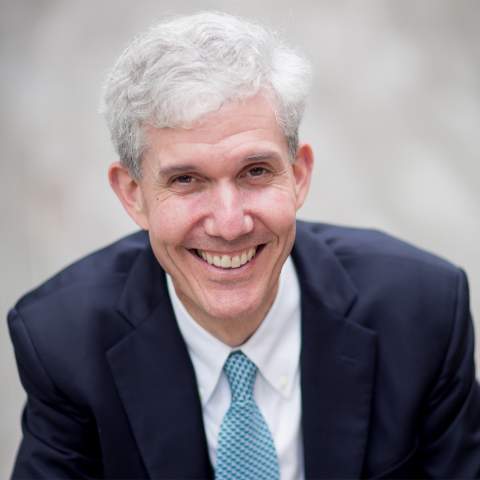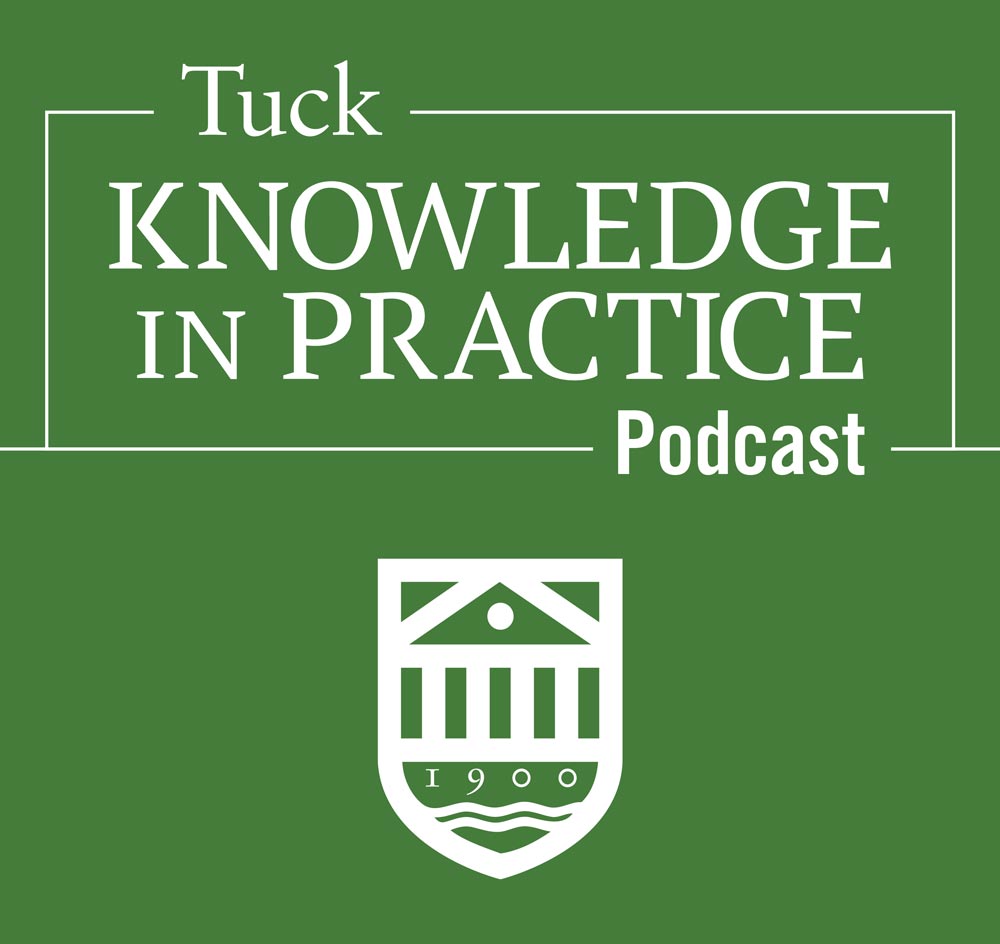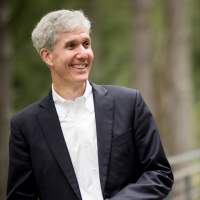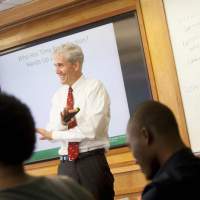Introducing the Tuck Knowledge in Practice Podcast
Matthew J. Slaughter, Dean of the Tuck School of Business at Dartmouth, joins as guest for the inaugural episode of the podcast.
In this first episode of the Tuck Knowledge in Practice Podcast, Dean Matthew Slaughter talks about the origins of the Tuck School in the late 19th century, what makes it distinct from other top business schools today, and his personal journey as a researcher and academic.
Dean Slaughter also explains the crucial role Tuck faculty play in developing wise and decisive leaders who better the world through business—which is the school’s mission. Tuck’s world-renowned scholar-teachers, through their rigorous and relevant research published in top peer-reviewed journals, model the process and methods of lifelong learning for their students, who must also be lifelong learners as they strive to make a continuous positive impact in the world.
Listen Now
Our Guest

Transcript
[This text may not be in its final form and may be updated or revised in the future. Accuracy and availability may vary. The authoritative record of the Tuck Knowledge in Practice Podcast is the audio record.]
“One of the lifelong aptitudes we talk about for our students is becoming a lifelong learner. To be wise throughout the years and decades beyond Tuck and part of being a lifelong learner is, how are you going to process information and form and test hypotheses in your organizations? So, there's a real parallel with that scientific method in peer reviewed research that our students are going to have to develop their personal versions of as they go out into the world.”
[Podcast introduction and music]
Kirk Kardashian: Hey, this is Kirk Kardashian. Welcome to Knowledge in Practice, a podcast from the Tuck School of Business at Dartmouth. In this podcast, we talk with Tuck professors about their research and teaching and the story behind their curiosity. As this is the very first episode of the podcast, I wanted to introduce listeners to Tuck, give a bit of historical context, and help explain what sets tuck apart as a research and teaching institution from other top business schools. I figured the best way to do that was to sit down with Matt Slaughter, the dean of the Tuck School. In addition to being the dean. Matt is the Earl C. Daum 1924 professor of international business. He's a member of the American Academy of Arts and Sciences, a life member of the Council on Foreign Relations, a research associate at the National Bureau of Economic Research, a member of the Academic Advisory Board of the International Tax Policy Forum, and an academic advisor to the McKinsey Global Institute. Matt studies multinational firms, international trade, labor markets, and the politics of globalization. I started off my conversation with Matt by asking him to take us back to the end of the 19th century to explain the origins of the Tuck School.
Matt Slaughter: The founding of the Tuck School was a pretty radical innovation in higher education. So go back to the late 1800s, and the United States was one of the world's big emerging markets. We were sort of like India or China of the day. Edward Tuck had attended Dartmouth College as an undergraduate, and he had gone on to be quite successful in some of the high technology industries of those days, like railroads and telegraphs and things like that. He had an old college roommate, William Tucker, who had gone on to become the president of Dartmouth, actually. And in the late 1890s, Edward Tuck reached out to William Tucker and said, you know, my organizations and other organizations, there's a need for capabilities for people to manage and lead our business organizations that we don't seem to be seeing coming out of the graduates of programs at the undergraduate level from Dartmouth and other such schools. So, they struck up a correspondence, and they ended up deciding that Dartmouth was going to create a new Master's level degree. It wasn't called the MBA at the time. It's been called different things over the time, but to meet the emerging needs of global businesses, as the talent needs were shifting and evolving, they realized that a new type of education was needed and thus was born the first graduate school of business in the world, the Tuck School of Business. It opened its doors in 1900. It was, like all startups, it had its ups and downs. Initially, if you walk the halls of Tuck, we have the pictures of every graduating class here in Tuck Hall.
The first graduating class was four people in 1901. It was a one-year program. Initially, a few years later it got down to one student and then on average it grew over time. Today, without gilding the lily, I have the honor of serving as Dean, in addition to being a faculty member here for many years. And I think we offer the most transformative MBA experience than a lot of other great programs of any school that's out there. So, the other thing that I'll add related to your question is, at Tuck investiture, the graduation for MBA candidates each spring, at the end of the ceremony, we read a letter from Edward Tuck to William Tucker in 1904, as the school had gotten going. And one of the quotes that we read from that letter talks about how Edward Tuck believed that altruism is the highest form of egoism. And I think that sense of working with and through other people to better our world, that theme has, I think, stuck with the Tuck School for 124 years and counting. So today the language we use is in our mission statement—Tuck develops wise, decisive leaders who better the world through business. That mission and the way we offer students a personal, connected and transformative experience and faculty in terms of the creation of knowledge through research and its teaching and application. That sense of working with and through other people and trusting teams really resonates with how the school was founded.
Kirk: So when you think about the faculty and its and its role at Tuck, obviously it's hugely important. It's probably one of the foundations of a business school is having a great faculty. What in your mind makes the faculty at Tuck distinct from faculty at other top business schools. How do you try to differentiate tuck from, say, MIT or Wharton or Harvard Business School?
Matt: I think there's a couple of important dimensions colleagues here really value. They've got to be grounded in a particular discipline. We tend to, I think, more than other places, to have faculty who work at the boundaries and across areas in the business academy and the broader academy, so that interdisciplinarity is something that allows the total research environment at Tuck to thrive a bit more than some other places. If you go to some much larger schools, they've got amazing faculty, and I have coauthors and friends at many of these schools. I think on average, more of their faculty tend to be more grounded in their original discipline in which they were trained. And their research really tends to focus on that particular discipline. We tend to have more colleagues at Tuck, though, grounded in a home discipline and excelling in that and building their research reputation, that tend to be also curious about connections with other fields and other topics. So, my research is an example of that. I'm an economist by training, but a lot of my work was on the political economy of globalization. So, I've done a lot of work with colleagues over the years and political science and in the field of strategy. There's a lot of points of contact with folks like me in economics that think about global businesses.
Kirk: Yeah, I think one of the things about Tuck that makes it special is the research to practice seminars that we have here, the RFPs. That I think is a pretty unique form. Of course, that doesn't exist in many places. Right. What do you what can you say about those RFPs?
Matt: [That’s] one of the many great creations of my predecessor, Paul Danos and faculty at the time. We created these electives at the Tuck School for MBA candidates, probably a little over ten years ago. The logic was we've got great scholar teachers. We've got faculty who are pushing the boundaries of knowledge through their research. The idea was to bring our students more in contact with that process. The content of whatever disciplines and areas our great faculty are working on, but also more generally, to get them, our students, to have more tangible contact with. As I said a little while ago, the scientific method we have at Tuck, we have a very rigorous and extensive and relevant core curriculum. And then our students take a suite of elective courses that they choose from. Our RTPs are a subsection of our electives. I think in recent years we've probably had each academic year I'm going to guess about a dozen TPS. They're taught by faculty. They're very small scale. They are the most of them are capped at no more than 15 students, because the students are meant to be real co-creators with the faculty of the content in the class.
Matt: That's true in a lot of our classes, but even more so in TPS. And so, the faculty who teach them there tend to be teaching their research and or related research in their home disciplines. And what the students love is they can self-select if they're very interested in a particular topic on multinational companies and global supply chains, or how innovation and strategy gets formed in firms. It's just a huge range of these that we have. The students self-select because they love the content and it's part of their personal connected path through Tuck that will be transformative. Faculty are akin to, for our listeners who understand, they're akin to PhD seminars in business schools that have PhD programs. But the students, I think, are being taught the content of working papers and recently published articles in peer reviewed journals, not to teach the students how to create the research themselves like we do with PhD candidates. We all did this in our earlier days as PhD students. But to apply this for what they're going to do in their management and leadership careers, I think.
Kirk: It's really interesting to think about how business leaders use and process information. Can you help out, say, a prospective student who's wondering, well, how am I going to use, say, research in my career? How does how does that play into what I'm going to be doing?
Matt: So it may play in two ways. One is the particular content you cover in core courses and electives may be in an area that is very relevant for the career that you seek. Again, not that the whole world is global economics, but I'll use that example for me, for students that may think I really want to help manage, lead, create, thrive in global organizations across borders. Wonderful. But there's a whole set of issues that we have great faculty in many of our areas at Tuck that think about those things on global supply chains and strategy formulation across borders and implementation. So that's the content of the richness of our faculty's research could be very relevant for a student. The second thing, it echoes a bit of what I just said. Think about the explosion of data that every alum of our school, in whatever organization they're in, is going to have access to. Probably the biggest difference relative to some earlier decades is the imminence of data and information, hopefully data that hopefully becomes information that firms can use to articulate and implement strategy to create sustained competitive advantage. So almost all of the faculty at Tuck, not all, but most do some empirical work, not just kind of pure theory work. That's all about processing, testing hypotheses, and formulating workable inferences from data. And so, there's so many ways where our students, by being connected to research, active faculty, are going to develop their facility with, harnessing and understanding data in a way that hopefully translates it into usable information for their organizations.
Kirk: I know that the Tuck faculty has grown recently. I think in the in, I think last year the school hired maybe 5 or 6 new tenured track.
Matt: Yeah. Great memory. We hired seven new tenure track faculty last year. There’s always a dynamism of the faculty labor market, like the American labor market, but we're bringing some of what I love to call our awesome faculty of the future.
Kirk: Yeah. So, how do you see the faculty growing or changing in the next couple of years or decade?
Matt: Great question. I think what won't change, it's like what I say to our alums, is the values that animate being a great faculty member at Tuck, like being a great student and alum at Tuck of faculty commitment to research, whatever that means, and then bringing that richness of their research into the classroom. There’s a lot of anecdotes, and I think some academic studies that have shown, on average, faculty who are connected with research in different ways, research active faculty tend to be better teachers for the reasons we've been discussing here. So that won't change. I think people who come to Tuck, who see wow, I can thrive in terms of my research with and through faculty and students, perhaps in different ways, and I can bring that enthusiasm into the classroom. That won't change. That's been true for any alums that might be listening when we when we hear about legendary faculty at the Tuck School, like James Brian Quinn, they really were scholar teachers in different ways. What research means, though, is, is always changing. So, one of the things that fascinates me is so many more of our faculty come in today, as we talked a bit about a lot of the research is empirical and the magnitude and scope and complexity of data sets that we can bring to bear to ask really managerially and leadership relevant research questions is really impressive. And so, the faculty of the future, I think the nature of how they do research and their commitment to being great scholar teachers won't change. But the methods of research and the questions they're asking, I think, will continue to change and evolve. And they should, because the world of business in the intersection of global businesses and civil society and sovereign governments continues to evolve, right. Going all the way back to what were the relevant issues in the curriculum and what faculty needed to be doing in 1900 when the Tuck School got founded. Like, it needs to be really different today in 2024 or we wouldn't be doing our jobs.
Kirk: So speaking of faculty, you are a faculty member at Tuck.
Matt: I am, yeah, I had the honor of joining the Tuck faculty in 2002. I was originally up the street in the economics department in 2001/2002. I started my career here at Dartmouth teaching the undergraduates in arts and sciences. And then after several years, I moved down the street to Tuck.
Kirk: Yeah. So, not every dean of a business school also teaches. I think it's great that you are active in the MBA curriculum, and you teach. So, I think it'll be nice just to hear a bit about how you got to Tuck and the things that you find interesting and things that you study and how that plays into your teaching, too.
Matt: Yeah. Thank you. I'm just one example of many faculty, but I think my example is illustrative of the enthusiasm that faculty bring to their research and teaching here at Tuck. So, my academic research has been on the political economy of globalization. I’ve focused my academic research and then my policy work on how multinational companies structure their operations around the world, how those companies operations and success interacts with public policy that sovereign governments make rules around international trade and investment and tax and immigration. And then a lot of it, too, has been on the impacts of all those operations on labor markets and the political economy. Part of it is, what do people think about globalization, citizens of countries. And as we know, in the United States and dozens of other countries in recent years, there's been this real backlash against globalization, what oftentimes gets called this protectionist backlash. So that's what my academic work has been on. And it has informed my teaching and the elective course that I teach at Tuck.
[Something I teach,] Even as Dean, which I love doing, is called Leadership in the Global Economy. And in that course, students prepare in writing and then present in class. And we cross examine mock congressional or parliamentary testimonies. And that class arose a little over ten years ago. I've had the honor, I'm a US citizen, of delivering testimony to the US Congress many times, and there's a real gap that I perceive that was opening up, especially in the wake of the global financial crisis, of leaders, of businesses who could articulate before Congress and the white House in different ways. The case for why they might be seeking special support from the government or more generally, just how their strategy supports American workers and families and communities. So that's what the class is about. But it's an example of how what I do in the classroom springs deeply from what has animated me as a scholar, and how that research and public policy work has presented an opportunity to have our students come in contact with it.
Kirk: Yeah. It's great. I think it's perennially a favorite course for Tuck students always.
Matt: That's kind of my mother in law's. Now Venmo you $10. No, that's kind of, it's a fun class to teach, but the heart of it is really the students. They really own it, because if they don't really invest in thinking about what would be a testimony, they have to write a testimony as if they were a leader of some organization, either today or in the future. I don't allow them to write a testimony for the perspective of a second year MBA candidate at Tuck, and so they really have to invest in finding a leadership voice that speaks to issues of, you know, the topics this past year were the trade war between the United States and China more broadly with other countries, global warming, climate change, rising inequality within and across nations, and should the US government pay reparations to black Americans. So, I teach a mini version of it, which, serving as Dean allows me to, to work that in with other Dean's activities. But the students own it. Like, as I always say to them day one, if we meet tomorrow and no one has written testimonies, then not a lot of is happening. But the students and I have colleagues from around the world that have gotten to kind of help run some of the sessions too, which is which is always fun. So, in recent years, we had like David Rubenstein has done a lot of the sessions with me on Rising Inequality because of his patriotic philanthropy. Charlene Barshefsky, Ambassador Barshefsky, helped us run the negotiations for China's accession into the WTO. She helps run the trade War Day. And Daniel Yergin, kind of a wonderful author on global energy markets and scholar, he helps run that day.
Kirk: Wow, that sounds fascinating and like a lot of fun for the students.
Matt: It's fun, I love it. It's great. It's a lot of fun.
Kirk: Do you use examples from business leaders who were testifying before Congress and kind of saying, like, this is a great example of someone who did an amazing job testifying?
Matt: Absolutely. There’s a wide range of examples of whether people were seemed to do a strong job articulating a leadership point of view and a not so strong job. I'll give one example that actually, I often will briefly discuss in class, which is why the class got created.
Speaker 1: The amount of money would be significant. I mean, we have we have suppliers. What is significant? $5 billion every month.
Matt: It was fall of 2008, November of 2008, when the world financial crisis was arguably at its depths. So, Lehman had gone bankrupt, and there was great fear that all three of the US automakers would go bankrupt and perhaps be liquidated. And this was at a time when the US economy was losing close to a million jobs a month.
Speaker 2: By March 30th, you're out of money. Is that correct?
Matt: And I'd served in the US government. And so, I knew then the chair of the House Financial Services Committee, Barney Frank.
Speaker 3: The financial industry. But doing it to a blue-collar manufacturing industry is somehow not right. And we have to look at the wage scale, etc.
Matt: And he asked if I would be a witness at a testimony they were convening. This was in mid-November on whether the US government should provide up to $50 billion in taxpayer assistance to the Big Three automakers. And I said, sure, that was a famous hearing which I'm sure you can find it in the archives online. A representative from Illinois asked each of the three CEOs, how did you travel here today? Did you fly private, or did you fly commercial? And they had all flown private.
Speaker 4: It's almost like seeing a guy show up at the soup kitchen in high hat and tuxedo.
Matt: Second, why should we, our taxpayer money, go to your companies rather than other companies in our districts? And if we do provide you the assistance, are you willing to work for $1 a year? And it was pretty remarkable the range of answers that the CEOs gave to both those questions, especially the one on compensation. But also, when you watch the hearing, as I discussed with the students, whether or not they seem to be prepared, whether or not they had had sort of done their homework. What I put to the students without being aggressive is should they have been surprised by that question? You're going before us taxpayers and asking for families that were being laid off, and maybe in districts that have no automobile production, why were we going to support the automobile industry rather than other industries? And why are we going to support companies rather than workers in communities?
Kirk: You mentioned some of the issues that you talk about in LGA currently. Are those sort of the same things that you're thinking a lot about as a researcher, as an academic, as just a citizen?
Matt: They are, yes. And again, I want people to hear this. Just an example. I think all of the awesome faculty colleagues I have at Tuck, what they teach is oftentimes so linked to what they think about in terms of their research and outreach. So, for me again, this is not a partisan statement, but there are few of any leaders in the United States, either on the Democratic or Republican side, that are articulating a story for what globalization should mean for the United States in this emerging 21st century. And that’s pretty bracing. We economists don't know a lot about a lot of things, but one of the things that is overwhelmingly clear is the direct and indirect ways in which global engagement through trade, investment and immigration helps raise the average standard of living in America. It doesn't directly always benefit every worker, firm and community, and that distributional pressure is a problem that we haven't addressed well, as a country we're not now. So, for me, when I'm thinking about these things serving as dean, I don't I don't do nearly as much academic research as I used to. I miss it, but it's definitely the things that are on my mind for some of the writings I do of op eds or policy related articles. And that deeply informs then when each fall rolls around and it's time to teach LGA again and preparing the syllabus and updating it, drawing on what seems to be the latest issues, coming from the research community and the related policy community on these topics. It's always on my mind. And I think that's true for so many faculty at Tuck for how what research means to them, how that infuses in different ways what they bring into the classrooms at Tuck.
Kirk: Yeah. So, that kind of leads me into my last question. From your perspective, what are some of the most pressing challenges facing the world today? And why are these challenges begging for leaders developed at Tuck?
Matt: One of the deepest challenges for most societies has been a corrosion of trust. There are a lot of ways that economists, political scientists, sociologists in their research measure trust between people or trust that people have in institutions or leaders. But across all those measures, there's been a there's been a marked decline in trust. And so that presents a real challenge for our world, because investments, whether they're investments in the private realm or in public investments, they're a foundational virtue for that is trust. If you're just capital markets, if you think about capital markets for a minute, the taking savings from individuals or organizations around the world and channeling them into an investment opportunities is deeply about trust. As a saver, you put your money in the bank if to in that simple metaphor, and then the bank is going to go make loans to somebody and you as the saver, hope to get some return on that in the future. Similarly, public investments in basic science, discovery or education, public education, those are investments in trust in intertemporally in the future. So, one of the dimensions of the corrosion of trust actually has been declining. Trust in the belief in what I would call just science, the scholar in me, which is pretty striking in the United States and some other countries. So that is a massive I'm a Tigger by disposition, a massive, though that's a bit of an assessment of the world, massive opportunity for students in all of our programs and the MBA, the heart at Tuck and all of our other programs because wise, decisive leaders, they in our definition of leadership at Tuck, they do two things.
Matt: One is they articulate a vision for tomorrow that's better than today. But second, they bring that vision to life with and through diverse and high performing teams, that second dimension of building teams to bring that vision of a better tomorrow to life that's deeply about trust. And so, though our world has a lot of challenges, the value of building trust and building trust-based teams to, to bring visions for better tomorrows to life, the heart of what we do at tuck in our in again in our mission statement, I think in some ways has never been higher. And so, we see this, I think with the success our graduates have in job placements, in that important next step back into the labor market. If we look at our alums at different career and life stages, it's remarkable the impact that alums have of our programs are doing around the world. So that I will say both as a professor here, and Matt, the dean gives me huge hope for what Tuck will continue to do in the times ahead with our research and the and the teaching and application of that knowledge.
Kirk: I'd like to thank my guest, Dean Matt Slaughter. You've been listening to Knowledge and Practice, a podcast from the Tuck School of Business at Dartmouth. Please like and subscribe to the show and if you enjoyed it, then please write a review as it helps people find the show. This show was recorded by me, Kirk Kardashian. It was produced and sound designed by Tom Whalley. See you next time.



